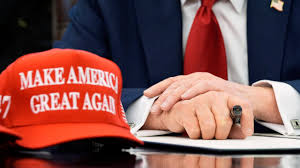
Breaking News
 Today's Technology: The Gateway to Psychotronic Weapons and the Reprogramming of Humanity
Today's Technology: The Gateway to Psychotronic Weapons and the Reprogramming of Humanity
 Netanyahu and Trump Host Libertarian Dinner!
Netanyahu and Trump Host Libertarian Dinner!
 American Doctor Organizations Are Such Shills for Big Pharma That They Cannot Be Trusted
American Doctor Organizations Are Such Shills for Big Pharma That They Cannot Be Trusted
 SCOTUS: Trump's DOGE Mass Federal Layoffs Can Resume
SCOTUS: Trump's DOGE Mass Federal Layoffs Can Resume
Top Tech News
 Insulator Becomes Conducting Semiconductor And Could Make Superelastic Silicone Solar Panels
Insulator Becomes Conducting Semiconductor And Could Make Superelastic Silicone Solar Panels
 Slate Truck's Under $20,000 Price Tag Just Became A Political Casualty
Slate Truck's Under $20,000 Price Tag Just Became A Political Casualty
 Wisdom Teeth Contain Unique Stem Cell That Can Form Cartilage, Neurons, and Heart Tissue
Wisdom Teeth Contain Unique Stem Cell That Can Form Cartilage, Neurons, and Heart Tissue
 Hay fever breakthrough: 'Molecular shield' blocks allergy trigger at the site
Hay fever breakthrough: 'Molecular shield' blocks allergy trigger at the site
 AI Getting Better at Medical Diagnosis
AI Getting Better at Medical Diagnosis
 Tesla Starting Integration of XAI Grok With Cars in Week or So
Tesla Starting Integration of XAI Grok With Cars in Week or So
 Bifacial Solar Panels: Everything You NEED to Know Before You Buy
Bifacial Solar Panels: Everything You NEED to Know Before You Buy
 INVASION of the TOXIC FOOD DYES:
INVASION of the TOXIC FOOD DYES:
 Let's Test a Mr Robot Attack on the New Thunderbird for Mobile
Let's Test a Mr Robot Attack on the New Thunderbird for Mobile
 Facial Recognition - Another Expanding Wolf in Sheep's Clothing Technology
Facial Recognition - Another Expanding Wolf in Sheep's Clothing Technology
President, Party, or Principle: What Should MAGA Stand For?

Considering "MAGA" as a brand name for a political movement (which is how it is commonly used), there is no way to definitively answer that question. But if we take the acronym literally and examine what it would mean to truly "Make America Great Again," the matter is much clearer and more significant.
To know what would make America great again, we must understand what America is. Obviously America is a nation, but one unlike any other. As Englishman G.K. Chesterton observed:
"America is the only nation in the world that is founded on a creed. That creed is set forth with dogmatic and even theological lucidity in the Declaration of Independence; perhaps the only piece of practical politics that is also theoretical politics and also great literature."
I do not here claim that America's founding creed—what both Ayn Rand and Leonard E. Read called "Americanism"—is the only thing that defines it. Some argue that other national character traits are also essential. Regardless, the convictions that drove America's founding fathers are certainly essential to what America is. America is defined by its founding philosophy: the ideals that were proclaimed in the Declaration of Independence, that motivated the American Revolution, and that were the chief objectives of the framers of the Constitution.
America has never completely lived up to those ideals, but to the extent that it has, it has thrived. America's foundational values—its moral greatness—are the root cause of its rise to material and cultural greatness throughout most of its history. "This," as Read wrote, "is the rock upon which the whole 'American miracle' was founded."
What are some of these values? As Thomas Jefferson wrote in the Declaration of Independence—echoing John Locke and expressing the prevailing ideology of Americans at the time—the sole purpose of government is to secure the rights of the governed. And when the founding generation spoke of "rights," they meant Lockean rights to person and property. As the Preamble of the Constitution later put it, the function of government is to "establish Justice, insure domestic Tranquility, provide for the common defence…"; in other words, to protect its citizens' rights against domestic criminals and foreign aggressors through courts, officers of the law, and military forces—nothing less, and certainly nothing more. It isn't government's role to provide people with food, education, or medicine. And what people do with their own persons and property is not the government's business to promote, prohibit, or otherwise regulate. Government, according to America's founding philosophy, has one job: protect rights.



